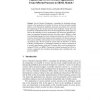Free Online Productivity Tools
i2Speak
i2Symbol
i2OCR
iTex2Img
iWeb2Print
iWeb2Shot
i2Type
iPdf2Split
iPdf2Merge
i2Bopomofo
i2Arabic
i2Style
i2Image
i2PDF
iLatex2Rtf
Sci2ools
122
Voted
FASE
2008
Springer
2008
Springer
Engineering Service Oriented Applications: From StPowla Processes to SRML Models
Service Oriented Computing is a paradigm for developing software systems as the composition of a number of services. Services are loosely coupled entities, can be dynamically published, discovered and invoked over a network. The engineering of such systems presents novel challenges, mostly due to the dynamicity and distributed nature of service-based applications. In this paper, we focus on the modelling of service orchestrations. We discuss the relationship between two languages developed under the SENSORIA project: SRML as a high level modelling language for Service Oriented Architectures, and STPOWLA as a process-oriented orchestration approach that separates core business processes from system variability at the end-user's level, where the focus is towards achieving business goals. We also extend the current status of STPOWLA to include workflow reconfigurations. A fundamental challenge of software engineering is to correctly align business goals with IT strategy, and as such ...
Business Goals | FASE 2008 | Process-oriented Orchestration Approach | Service Oriented Computing | Software Engineering |
Related Content
| Added | 19 Oct 2010 |
| Updated | 19 Oct 2010 |
| Type | Conference |
| Year | 2008 |
| Where | FASE |
| Authors | Laura Bocchi, Stephen Gorton, Stephan Reiff-Marganiec |
Comments (0)

